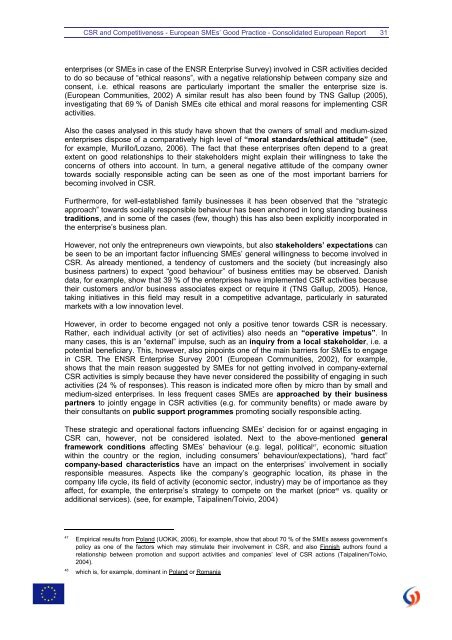CSR and Competitiveness European SMEs - KMU Forschung Austria
CSR and Competitiveness European SMEs - KMU Forschung Austria
CSR and Competitiveness European SMEs - KMU Forschung Austria
You also want an ePaper? Increase the reach of your titles
YUMPU automatically turns print PDFs into web optimized ePapers that Google loves.
<strong>CSR</strong> <strong>and</strong> <strong>Competitiveness</strong> - <strong>European</strong> <strong>SMEs</strong>’ Good Practice - Consolidated <strong>European</strong> Report 31<br />
enterprises (or <strong>SMEs</strong> in case of the ENSR Enterprise Survey) involved in <strong>CSR</strong> activities decided<br />
to do so because of “ethical reasons”, with a negative relationship between company size <strong>and</strong><br />
consent, i.e. ethical reasons are particularly important the smaller the enterprise size is.<br />
(<strong>European</strong> Communities, 2002) A similar result has also been found by TNS Gallup (2005),<br />
investigating that 69 % of Danish <strong>SMEs</strong> cite ethical <strong>and</strong> moral reasons for implementing <strong>CSR</strong><br />
activities.<br />
Also the cases analysed in this study have shown that the owners of small <strong>and</strong> medium-sized<br />
enterprises dispose of a comparatively high level of “moral st<strong>and</strong>ards/ethical attitude” (see,<br />
for example, Murillo/Lozano, 2006). The fact that these enterprises often depend to a great<br />
extent on good relationships to their stakeholders might explain their willingness to take the<br />
concerns of others into account. In turn, a general negative attitude of the company owner<br />
towards socially responsible acting can be seen as one of the most important barriers for<br />
becoming involved in <strong>CSR</strong>.<br />
Furthermore, for well-established family businesses it has been observed that the “strategic<br />
approach” towards socially responsible behaviour has been anchored in long st<strong>and</strong>ing business<br />
traditions, <strong>and</strong> in some of the cases (few, though) this has also been explicitly incorporated in<br />
the enterprise’s business plan.<br />
However, not only the entrepreneurs own viewpoints, but also stakeholders’ expectations can<br />
be seen to be an important factor influencing <strong>SMEs</strong>’ general willingness to become involved in<br />
<strong>CSR</strong>. As already mentioned, a tendency of customers <strong>and</strong> the society (but increasingly also<br />
business partners) to expect “good behaviour” of business entities may be observed. Danish<br />
data, for example, show that 39 % of the enterprises have implemented <strong>CSR</strong> activities because<br />
their customers <strong>and</strong>/or business associates expect or require it (TNS Gallup, 2005). Hence,<br />
taking initiatives in this field may result in a competitive advantage, particularly in saturated<br />
markets with a low innovation level.<br />
However, in order to become engaged not only a positive tenor towards <strong>CSR</strong> is necessary.<br />
Rather, each individual activity (or set of activities) also needs an “operative impetus”. In<br />
many cases, this is an “external” impulse, such as an inquiry from a local stakeholder, i.e. a<br />
potential beneficiary. This, however, also pinpoints one of the main barriers for <strong>SMEs</strong> to engage<br />
in <strong>CSR</strong>. The ENSR Enterprise Survey 2001 (<strong>European</strong> Communities, 2002), for example,<br />
shows that the main reason suggested by <strong>SMEs</strong> for not getting involved in company-external<br />
<strong>CSR</strong> activities is simply because they have never considered the possibility of engaging in such<br />
activities (24 % of responses). This reason is indicated more often by micro than by small <strong>and</strong><br />
medium-sized enterprises. In less frequent cases <strong>SMEs</strong> are approached by their business<br />
partners to jointly engage in <strong>CSR</strong> activities (e.g. for community benefits) or made aware by<br />
their consultants on public support programmes promoting socially responsible acting.<br />
These strategic <strong>and</strong> operational factors influencing <strong>SMEs</strong>’ decision for or against engaging in<br />
<strong>CSR</strong> can, however, not be considered isolated. Next to the above-mentioned general<br />
framework conditions affecting <strong>SMEs</strong>’ behaviour (e.g. legal, political 47 , economic situation<br />
within the country or the region, including consumers’ behaviour/expectations), “hard fact”<br />
company-based characteristics have an impact on the enterprises’ involvement in socially<br />
responsible measures. Aspects like the company’s geographic location, its phase in the<br />
company life cycle, its field of activity (economic sector, industry) may be of importance as they<br />
affect, for example, the enterprise’s strategy to compete on the market (price 48 vs. quality or<br />
additional services). (see, for example, Taipalinen/Toivio, 2004)<br />
47<br />
Empirical results from Pol<strong>and</strong> (UOKiK, 2006), for example, show that about 70 % of the <strong>SMEs</strong> assess government’s<br />
policy as one of the factors which may stimulate their involvement in <strong>CSR</strong>, <strong>and</strong> also Finnish authors found a<br />
relationship between promotion <strong>and</strong> support activities <strong>and</strong> companies’ level of <strong>CSR</strong> actions (Taipalinen/Toivio,<br />
2004).<br />
48<br />
which is, for example, dominant in Pol<strong>and</strong> or Romania




